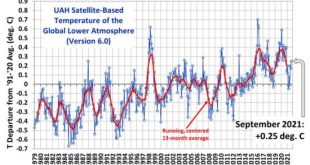Printed by means of Straits Instances (Singapore) on 10 January 2020
By way of Tilak Doshi and Euston Quah
Some commentators have known as for extra drastic motion from Singapore’s policymakers to “mitigate”, or scale back, the results of local weather alternate.
One educational, as an example, wrote pointedly: “We will proceed to reject plastic straws, however to seriously scale back its greenhouse gasoline emissions and future-proof its economic system, Singapore will have to undertake a technique to shift its reliance at the petroleum and refinery trade.”
The latter, stated Assistant Professor Angel Hsu of Yale-NUS School in a Dec 23 statement on CNA on-line, accounts for part of Singapore’s greenhouse emissions.
Alternatively, you will need to explain what Singapore policymakers can genuinely do this is significant and environment friendly, given the affect of such measures at the lives of unusual running Singaporeans.
Key questions of financial trade-offs (the prices and advantages of a better carbon tax, decreasing plastics, as an example) and the distributional affects around the inhabitants and time want to be matter to rational debate. Insurance policies formed by means of inexperienced ideology will result in Singapore collapsing economically first earlier than it is going to drown in sea stage upward push.
Consistent with Prof Hsu, Singapore will have to undertake a technique to shift its reliance at the petroleum and refinery trade in favour of “blank power” investments similar to electrical automobiles, battery garage and environment friendly power home equipment. Explicit coverage measures proposed come with “a extra competitive solar power highway map”, a goal for net-zero power constructions by means of 2030 and a far upper carbon tax.
Must all of us soar temporarily onto the golf green bandwagon, or pause and sparsely confirm what calls for motion, and what sort of it might charge? It isn’t a query of whether or not we must be greener, however how inexperienced we wish to be and at what tempo.
Other international locations are at other ranges of construction, enlargement and high quality of existence. Nationwide priorities will naturally be other as with the prices and advantages to their societies in adopting one set as opposed to some other.
WHITHER RENEWABLE ENERGY?
Within the debate about inexperienced power transitions, the basic realities of legacy, scale and inertia are entrance and centre in any affordable dialogue of local weather alternate insurance policies. Power transitions don’t seem to be surprising progressive advances. They’ve taken lengthy classes of time, usually a number of generations to often spread new processes that step by step alternate the composition of fuels used to generate gentle, warmth and movement.
We are living in a “fossil-fuel civilisation”, as well known Canadian environmental science professor Vaclav Smil phrases it.
In 2018, roughly 85 according to cent of industrial number one power used to be provided by means of the trio of fossil fuels: coal, oil and herbal gasoline. Renewable power applied sciences similar to sun, wind and trendy biofuels (aside from hydro and nuclear) accounted for simply four according to cent.
It took 100 years of the 19th century for coal to account for 50 according to cent of world power manufacturing, changing mankind’s earliest “deficient guy” fuels similar to foraged wooden, animal dung and agricultural waste.
And from its early beginnings within the 1870s, it took some other 100 years for oil to come back as much as its present proportion of kind of a 3rd of world number one power fed on.
It additionally took nearly a century for herbal gasoline to account for approximately a 5th of world number one power call for by means of the 1980s, from its beginnings within the early 20th century.
There’s little proof nonetheless of an accelerating power transition, regardless of bold calls by means of Ecu Union and United Countries leaders for halving international emissions by means of 2030 and reaching net-zero emissions by means of 2050, made on the fresh inconclusive UN local weather alternate summit in Madrid.
BP’s base case forecast sees renewable power accounting for 15 according to cent in 2040 and the fossil gasoline trio (coal, oil and herbal gasoline) handing over nearly 3 quarters of world number one power provide. This forecast is widely consistent with the ones of alternative authoritative resources, such because the Global Power Company and the US Division of Power.
THE SINGAPORE CASE
Singapore performed a century-long function as an oil garage centre (in Pulau Bukom) in colonial occasions earlier than hastily creating into Asia’s premier oil refining and buying and selling centre by means of the 1970s.
The congealed investments in Singapore’s oil infrastructure are huge. With a refining capability of over 1,000,000 barrels an afternoon, the tens of millions of lots of metal, concrete, and mechanised and digital procedure apparatus, as cumulative price added which accompanied Singapore’s oil trade construction, don’t seem to be simply captured in nationwide statistics.
In Singapore’s nationwide accounts, the “chemical” business cluster (which contains petroleum refining, petrochemicals, speciality chemical compounds and others) contributed nine.three according to cent of price added to overall production in 2018. The marine and offshore engineering section (basically drilling rigs and offshore oil and gasoline apparatus) accounted for an additional 11.three according to cent. In combination, those two industries accounted for over a 5th of producing gross home product.
Evaluating the value-added contribution of those two industries in opposition to the ones of electrical automobiles, battery garage, inexperienced constructions and solar energy ignores the problems of legacy, scale and inertia.
The 2 sectors are incommensurate, differing in price added by means of orders of magnitude. It must be famous too that the 2 sectors would range by means of their in depth from side to side linkages, as an example, actions generated by means of the oil garage, refining and buying and selling sector with different sectors similar to monetary products and services (commerce and mission finance, commodity agents, power information newshounds, chance control products and services, and others), upstream providers of metal, concrete and kit, and the leisure and repair industries.
The important thing query for policymakers is easy methods to make a viable transition to destiny applied sciences and companies with out destroying price in sectors of the economic system which are “have compatibility for goal” for some other part century or extra.
Singapore’s policymakers want to make a decision whether or not they are able to so simply organize a transition to a “post-oil” destiny with out disrupting the prevailing price added, jobs and the lives of unusual Singaporeans, and achieve this whilst including a purported an identical quantity or extra of so-called destiny inexperienced jobs but to be realised.
Singaporeans can’t manage to pay for to be piqued into demonising fossil fuels – Singapore’s proceeding function as an oil refining centre wishes a clear-headed solution to measuring the prices and advantages of what might be an over-hasty transition to more recent however much less environment friendly applied sciences.
Relating to an steadily heard competitive highway map for solar energy, the fundamental Economics 101 query has no longer been spoke back. If renewables together with sun are so aggressive, why do they steadily require large subsidies? Whilst statistics of the penetration fee of sun roofs within the Singapore landed personal residential marketplace don’t seem to be to be had to the authors, not unusual commentary suggests they don’t seem to be that popular. “Why is that?” can be a normal economist’s query.
On the policymaker’s macro stage, same old cost-benefit calculus of renewable power pertains to the era’s explicit traits of “intermittency”: there’s energy simplest when the solar shines or the wind blows.
There’s well-established peer-reviewed literature at the examples of Germany, California in the USA, and South Australia. Those international locations or states be offering beneficiant taxpayer-financed subsidies and regulatory mandates for encouraging sun and wind energy adoption.
Empirical knowledge suggests that when penetration charges for solar energy and wind energy (each intermittent, dependent at the climate) move a lot previous 10 according to cent to 15 according to cent of the electrical energy grid, systemic prices of balancing the grid in opposition to contingent climate variables mount exponentially.
Who pays for those upper prices? Which “stand-by” corporations must step in to provide electrical energy when the elements determines inconsistently that sun or wind is not able to offering energy? And at what charge?
INTERNATIONAL COMPETITIVENESS
Must policymakers legislate absolutely “carbon-neutral” constructions if such measures compromise Singapore’s world competitiveness by means of elevating rents and prices of shopping for business belongings? Will 100 according to cent “carbon neutrality” charge us our skill to take part in world commerce?
Likewise, early strikes on carbon pricing in Asia are prone to stay restricted. Singapore is the primary on report to put into effect a national carbon tax of just below US$four.00/tCO2e (ton of carbon dioxide an identical, a measure of greenhouse gases emitted) on huge business emitters from ultimate 12 months.
This constitutes a excellent begin to pricing an exterior impact of damage at the surroundings by means of manufacturers, and for all customers as nicely to keep in mind that their movements lift a worth that must be accounted for. There’s a follow-up plan to scale up the carbon tax ultimately and it is vital for society to regulate to this new tax in paying for the actual prices in the use of assets.
World warming isn’t a very simple or simple downside to maintain. Answers similar to carbon pricing to replicate the total charge of financial actions are steps in the fitting course, as is the requirement to worth intangibles or externalities as they have an effect on the surroundings. However international locations must be allowed to head inexperienced at a tempo desired by means of their electorate, and at a worth they are able to manage to pay for.
It is very vital that we select insurance policies which are in line with a cautious research of prices and advantages and knowledgeable decision-making such that rationality prevails.
Tilak Doshi is a Singapore-based power advisor. Euston Quah is Albert Winsemius Chair Professor and head of economics at Nanyang Technological College. He’s additionally president of the Financial Society of Singapore.
Printed by means of Straits Instances (Singapore) on 10 January 2020
https://www.straitstimes.com/opinion/can-spore-really-transit-to-a-post-oil-economy
 Daily News Latest trending news
Daily News Latest trending news




